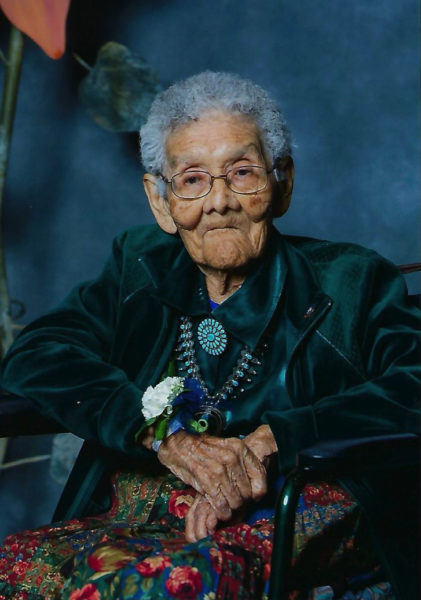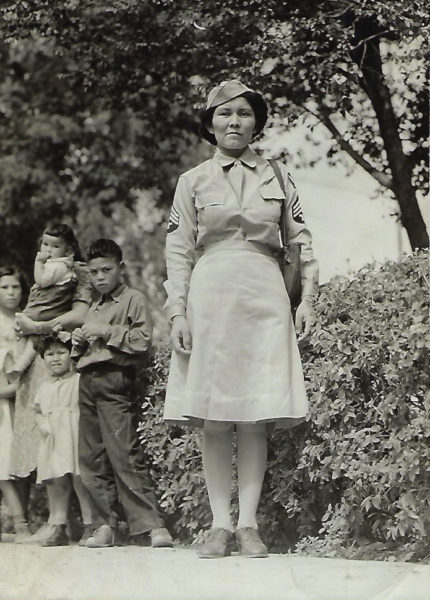
- Details
- By Native News Online Staff
UPDATED: January 29, 2020
WINDOW ROCK, Ariz. — The Navajo Nation is mourning the passing of Sophie Yazzie, the longest-living veteran in the state of Arizona and a tribal citizen of the Navajo Nation. Yazzie passed away on Saturday in Tucson. She was 105.
On Tuesday, Navajo Nation President Jonathan Nez and Vice President Myron Lizer issued a proclamation in honor and remembrance of Sophie Yazzie, the longest-living veteran in the state of Arizona who passed on Jan. 25 at the age of 105. The proclamation orders all flags on the Navajo Nation to be flown at half-staff in honor and memory of Sophie Yazzie on Jan. 29, 2020. CLICK to read the proclamation.
“On behalf of the Navajo people, we offer our thoughts and prayers for the family of the late Sophie Yazzie, a matriarch for her family and a warrior for our Navajo people who served our country with great honor and dignity. To her family, we pray for comfort during this difficult time,” said Navajo Nation President Jonathan Nez.
 A youthful Sophie Yazzie in uniform during her term of service in the
A youthful Sophie Yazzie in uniform during her term of service in the
Women’s Army Corps in World War II. Photo courtesy of the Navajo Nation
Yazzie was born in 1914 in Canyon de Chelly, Ariz. At the age of 28, she enlisted in the U.S. Army Air Corps and served during World War II until she was honorably discharged. Following her military service, Yazzie returned home and worked at Wingate Boarding School while raising her four children with her husband before retiring.
In addition to her four children, she and husband, Jordan B. Yazzie, had five grandchildren and five great-grandchildren.
The funeral service for Sophie Yazzie is scheduled for Wednesday, Jan. 29, 2020 at 10:00 a.m. at St. Michael Catholic Mission Church in St. Michaels, Ariz. The burial will be at Fort Defiance Veterans Memorial Cemetery in Fort Defiance, Ariz. following the funeral service.
More Stories Like This
Native News Weekly (August 25, 2024): D.C. BriefsUS Presidents in Their Own Words Concerning American Indians
Native News Weekly (August 4, 2024): D.C. Briefs
Monday Morning: (August 4, 2025): Articles You May Have Missed This Past Weekend
ICYMI: Native Bidaské: Downwind from Trinity, Radioactive Legacy
Help us tell the stories that could save Native languages and food traditions
At a critical moment for Indian Country, Native News Online is embarking on our most ambitious reporting project yet: "Cultivating Culture," a three-year investigation into two forces shaping Native community survival—food sovereignty and language revitalization.
The devastating impact of COVID-19 accelerated the loss of Native elders and with them, irreplaceable cultural knowledge. Yet across tribal communities, innovative leaders are fighting back, reclaiming traditional food systems and breathing new life into Native languages. These aren't just cultural preservation efforts—they're powerful pathways to community health, healing, and resilience.
Our dedicated reporting team will spend three years documenting these stories through on-the-ground reporting in 18 tribal communities, producing over 200 in-depth stories, 18 podcast episodes, and multimedia content that amplifies Indigenous voices. We'll show policymakers, funders, and allies how cultural restoration directly impacts physical and mental wellness while celebrating successful models of sovereignty and self-determination.
This isn't corporate media parachuting into Indian Country for a quick story. This is sustained, relationship-based journalism by Native reporters who understand these communities. It's "Warrior Journalism"—fearless reporting that serves the 5.5 million readers who depend on us for news that mainstream media often ignores.
We need your help right now. While we've secured partial funding, we're still $450,000 short of our three-year budget. Our immediate goal is $25,000 this month to keep this critical work moving forward—funding reporter salaries, travel to remote communities, photography, and the deep reporting these stories deserve.
Every dollar directly supports Indigenous journalists telling Indigenous stories. Whether it's $5 or $50, your contribution ensures these vital narratives of resilience, innovation, and hope don't disappear into silence.
 The stakes couldn't be higher. Native languages are being lost at an alarming rate. Food insecurity plagues many tribal communities. But solutions are emerging, and these stories need to be told.
The stakes couldn't be higher. Native languages are being lost at an alarming rate. Food insecurity plagues many tribal communities. But solutions are emerging, and these stories need to be told.
Support independent Native journalism. Fund the stories that matter.
Levi Rickert (Potawatomi), Editor & Publisher

